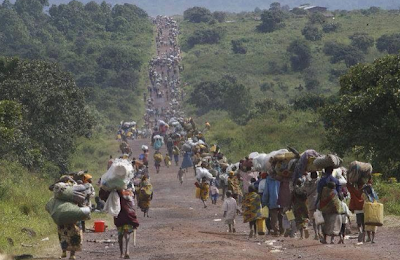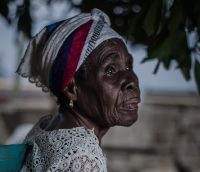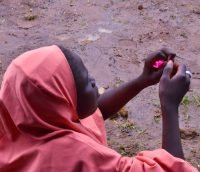The impact of the long trek Huzaifa had just had was beginning to show in her carriage. Her refusal to buckle was entirely due to sheer will…and the fact that her babies would suffer in her fall. She had been carrying Aisha on her back and Musa on her neck. It was hard work but at least she got these two out. The whereabouts of Jamilu, Hassan and Hussaina was something she didn’t want to dwell on. All she could focus on was ensuring she got as far away from Mubi as possible. Her bare feet were chaffed and had blisters running from her toe nails to her heels but she couldn’t let the pain sink into her thoughts. The weight of Musa on her neck had given her a hard knot around her shoulder and if she so much as moved her current position, she was sure that the muscle would snap. When she finally got to the Hayin Gada Bridge, all she could think of was crossing the bridge. ‘She would be safe in Yola’, she thought to herself. She just needed to hold on until she got to Yola.
Huzaifa was not the only one fleeing Mubi. She was one of the thousands who had fled when the insurgent group, popularly called Boko Haram, invaded (and captured) Mubi, the second largest city and most viable economic epicenter in Adamawa state in October, 2014. John was another. He had run from home as soon as he had heard the tata tata ta of guns firing. He left his wife and four kids, taking with him only his phone, his wallet and the clothes he was wearing. John had thought through his predicament and realized that being a man, and a young one at that, his fate was either to join the insurgents or a certain death. He didn’t want to be a part of a group of men whose ideals meant that they could kill, pillage and destroy communities at whim and he sure didn’t want to die. As he ran, he hoped his children would be safe though, the fate of his wife was a sure thing if she was captured; young and beautiful as she was. He dulled the thought of his wife and kids as he zigzagged his way in the bushes. After two days in the bush and his endurance of a major heat stroke, he finally found a taxi, albeit an expensive one, heading to Yola. He needed to get to Yola. Once he got there, he would think of the family he had left behind.
These examples (and many more) are the stories coming out of Mubi. Whether it is students running into Cameroun or people piled on each other on tricycles, motorcycles, cars, or trailers, the main issue is that the story coming out of Mubi is horrible. And worse, there were no Christians, no Muslims and no atheists. All there was were Nigerians running away from a common enemy. Heck, even the soldiers were running away in the face of the heavy artillery wielded by the insurgents.
The insurgents behind the escapees were not their only problems. As they ran through bushes, in the stifling heat that is characteristic of Adamawa, many of these people were without food or water, resulting in massive hunger. Now, the adrenaline pumping through their veins may have pushed the thought of food out of their minds but running without water in a hot (hot) place is akin to embarking on a suicide mission. Many people were reported to have drunk water from sources as filthy as gutters or roadside puddles. These were not the worst of their problems though.
As people strove to get away from Mubi, imagine their relief when they saw cars lined up, also fleeing from the insurgents. Many ran to such vehicles, pleading to be taken along. The drivers, while running for their lives, didn’t let the opportunity to make a quick buck pass them by. Transport fares from Yola to Mubi was usually around N1,500 but, as soon as the drivers saw the fleeing citizens, fares went as high as N7, 000. And boy! Did people pay! If you didn’t have any money, then ‘GOD save you’ was the meted response. People had to trek from Mubi to as far as Hong. In the end, the governor, Barrister Bala James Ngilari, had to send, (as released by the press secretary) a total of seventy-seven buses to fetch those on the road.
One would think that getting to Yola would mean some form of respite for the displaced people but it wasn’t. The NAPEP riders in Yola also hiked their transport fares, collecting one hundred naira (N100) instead of the stipulated fifty naira (N50). People would have paid two hundred naira if possible but the vehicles just weren’t there. The buses had been just enough for the residents of the Yola metropolis but with the massive influx of people into town, buses were scarce. People literally had to jump on moving vehicles and be packed like sardines. Buses that normally carried about 10 passengers with the driver and conductor making it 12, were carrying as many as 15 and in some cases, up to 18 or 20 people. It was not a pleasant sight at all. At a point, people just gave up on waiting for the buses or NAPEP and took to walking long distances within the town to get to where they were going to.
And trust the security men to become active after there has been an incident. The checkpoints that were a common site in Jimeta and Yola soon doubled. The traffic gridlocks soon became unbearable. It wasn’t as if any checks were being done, but the security personnel had to look busy. The only people credit had to be given to, were the men from the Federal Road Safety Commission, who worked tirelessly to ensure that the gridlock was broken and traffic was relatively smooth. Apart from that, the Police as usual set up checkpoints close to where the Army had theirs, as if they could detect what the army could not. Their eager-beaver attitude didn’t fool anyone into believing that the checkpoints were anything more than an avenue to get money from motorists and to bully people with their uniforms and guns. As a result of these checkpoints, traffic from Sangere (where the University is) to Yola (where the Emir resides) was cumbersome and quite frankly, very annoying.
Other people, especially women, had been exploited through inappropriate propositions. One man, a NAPEP rider, seeing the high influx of women into the Jimeta metropolis, said he was going to take more wives because he was sure the women he was seeing on the road had been separated from their husbands. He went as far as propositioning one with a sachet of water after seeing her bend in tiredness. He asked if she had a husband and if not, if she was willing to get married immediately. It was shameful to watch something like that happen. The man had no pity, no shame and definitely no inhibitions. In all, it seemed that the flight of people from Mubi showed the starkly inhumane nature of not just the terrorists, but the average, everyday man who looks normal, but who isn’t quite.
The most infuriating thing that happened came from politicians. Many of them went about their normal campaigns like nothing was amiss. The drama started on Wednesday, October 29, 2014, and on Friday, some people were still campaigning. It was utterly shameful that people were hungry, lost, depressed and dejected, and sleeping on the streets yet politicians were busy clamoring for votes. They were not even sending condolence messages to the displaced people. They were waiting for someone to kick start the goodwill messages so that they could jump on the train. When television and radio stations started talking to and showing that the wife of the Governor had gone to deliver relief materials to the internally displaced people, everyone suddenly wanted to do something for them. Media crews were working overtime to keep up with the affluent giving relief materials to the ‘poor’. After all, what was the point of being helpful if there were no flashing cameras and a teeming audience to watch? Like George Orwell rightly said, some animals really were more equal than others.
Other regions of the country didn’t even care that the North-Eastern region was slowly burning down to the ground. The country was quiet when the insurgency was just in Maiduguri. It was quiet when the insurgency spread from Maiduguri to all of Borno, then Yobe and now, the entire Mubi. Imagine four whole local governments – Mubi North and South, Michika and Maiha – completely run over by these insurgents. People in their hundreds of thousands have fled and are still fleeing and all this while, people are just going about their lives, unbothered by the state of the nation. Yola is a bed breeding fear and many Yola residents are stocking up on food, fuel and money, hoping for a quick escape if the insurgents decide to act. Again, the nation is just going about her events and her activities. It is scary that with the exaggerated headlines most newspapers carry about what is happening in Adamawa, most people are still unconcerned.
The truth is many Nigerians do not have nationalistic views. All we care about are ourselves. As long as we are okay, we go about our lives as usual. It is only when something touches us that we cry blue murder. There is no one whose hands are on fire that would just seat back and watch it become Suya. If it is unreasonable to watch your hand burning and do nothing about it, shouldn’t it be unreasonable to watch a part of the country burn and not be concerned? Are we going to wait until the insurgents creep to Abuja, Lagos or Port Harcourt before we act or are we unconcerned because the people suffering these horrible plights are villagers, ‘bush people’, the uneducated and unexposed, the ‘unimportant’ citizens of the country? Well, from little villages, the insurgents have crept into towns and trust me, if we do nothing, if we fold our hands and watch, if we continue to go about our businesses like dead and dying people are just numbers and not people, we will have our cities, our fortresses, our calm streets and safe neighborhoods also run down by these insurgents. We owe it to our brothers in the North East as well as to history; for history is the one that will condemn us for our silences, for our nonchalance and for our inaction.
We need to hold our government responsible for every life lost since this insurgency and every life that has been displaced or disconnected from their families. The present administration is spending on stupid frivolities when the nation is dying. These people are as far away from the bombs going off and the invaded cities as the poor in the country are as far from the nation’s wealth. The present administration doesn’t care about the Nigerians suffering and their apathy is only matched by the opposition trying as hard as possible to take over from the current administration. Like Michael Jackson aptly said, they don’t care about us.
Oh! Nigerians! How long are we going to sit back and see our people maimed, kidnapped, raped and killed? How long will our apathy hold before we deem it fit to show some form of sympathy? How long do you think the insurgents will hold the North East before they totally overpower and destroy it? And when this happens, how long do you think these insurgents will take to go further into the country, to take your precious Abuja, your beautiful Lagos and your cosmopolitan Port Harcourt? Is that when you will speak up? Is that when you will organize rallies and sit-ins on the road? Is that when you will demand the resignation of the government because it has failed? Is that when you will demand that anyone who has been in power before should drop out of any race for the presidency? Is that when you will become true nationals?! Well, if that is what you want to do, keep on doing that. But be rest assured that true nationalism cannot be had when bombs are dropping on your heads.
And to the youth, if they don’t care about us, do you also not care about us?







